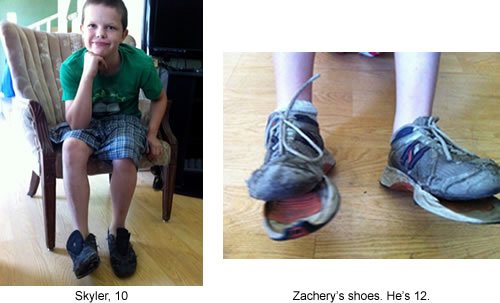For Immediate Release
September 23, 2011
For More Information Contact:
Patti Hassler
phassler@childrensdefense.org
(202) 662-3554
Number of Poor Children under Six Rises in 43 States
Washington, D.C.—New state by state poverty data released by the U.S. Census Bureau brings more bad news for children. In 2010, over a million more children fell into poverty, over half a million more into extreme poverty. Nearly all states saw increases in poverty for children under six—the most critical years for brain development. The number of poor newborns to kindergartners increased in 43 states in 2010.
- Forty-one states saw an increase in extreme child poverty in 2010. Over 7 million children lived in extreme poverty.
Children of color were disproportionately poor:
- Over one in four Black children were poor in 41 states and the nation’s capital.
- Over one in four Hispanic children were poor in 43 states.
- Forty percent or more of Black newborns to kindergartners were poor in 30 states and the nation’s capital, including 15 states where half were poor.
- Forty percent or more of Hispanic newborns to kindergartners were poor in 14 states.
Based on the national poverty data from the Census Bureau released last week:
- The number of poor children—16.4 million—living in the richest nation on earth exceeds the entire combined populations of Haiti and Liberia, two of the poorest countries on earth.
- The number of extremely poor children—7.4 million—in our nation is equivalent to the population of Israel.
- The number of poor children under five—5.5 million—exceeds the population of Sierra Leone.
“Is this the best America can do?” Children’s Defense Fund president, Marian Wright Edelman, asked. “Is this the reflection of our values as a nation? These child poverty statistics are morally and economically indefensible. The toxic cocktail of poverty, family joblessness and stress, food insecurity, lost homes and growing hopelessness are a national human disaster requiring the most urgent response from our political and business leaders in every party and place. Children deserve more than intransigent political grandstanding. They need shoes to protect exposed toes from the cold. Shame on those who seek to rip out more threads from our rich nation’s tattered safety net while protecting tax cuts for millionaires. Skyler and Zachary and Jordan McKee and the millions of children like them deserve more from our country.”
Shoes tell the story of the McKee family’s descent into poverty. Those of Skyler, 10, and Zachery, 12, are falling apart. Their sister, Jordan, 14, wears the varsity coach’s shoes when she plays on her school’s volleyball team. Less visible is hunger. The children and their parents, Tonya and Ed McKee, of Dowagiac, Michigan, sometimes went without food this summer when Ed’s unemployment insurance ran out and the family was not yet receiving food stamps. Skyler said he gave the birthday money he got at church to his mom for groceries “and I told her she didn’t have to pay me back.” Skyler confided that sometimes his stomach has growled. “It’s hard not easy like it was before where we had money and could do stuff. Now we don’t go anywhere… Sometimes we don’t have food and we just don’t eat.”
The McKee family lives in Michigan’s sixth congressional district, represented by Super Committee member Representative Fred Upton. One in four children in this district was poor in 2010, an increase of 17 percent in one year. Nearly 10 percent of the children living in the district were extremely poor.
- Poverty is defined as an annual income below $22,314 for a family of four—$1860 a month, $429 a week, or $60 a day. Extreme poverty, defined as an annual income of less than half of the poverty level, means $11,157 a year, $930 a month, $215 a week, or $30 a day for a family of four.


